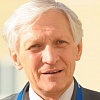Project: Security and Development in the Middle East: Trends and Challenges
- RIAC and Emirates Center for Strategic Analysis and Research Discussed Opportunities for Cooperation
- International Experts Discuss Latest Trends in Political Development in the Islamic Republic of Iran
- Russian and French Experts and Diplomats Discuss Interaction of the Two Countries in the Middle East
The Middle East remains a region of tensions due to the persisting contradictions between regional actors, as well as social and political instability in several countries. Therefore, political and economic trends in the Middle East are in need of theoretical understanding. To study the dynamics of political and economic developments in the region, it is important to identify the underlying cause-and-effect patterns in regional processes as well as drivers of systemic transformations in the Middle East.
The aim of the project is to explore the main trends in the region’s political and economic development. The objectives of the project include determining the parameters of political and economic dynamics in the Middle East, patterns of systemic transformation in international relations, as well as development trajectories in the Middle Eastern countries.
The project offers a closer look at the prospects for fostering Russia’s relations with Turkey, Iran, Syria, Egypt, Saudi Arabia, the UAE, Israel and other countries in the region.
Project Partners
-
Institute of Oriental Studies of the RAS
-
IMEMO RAS
-
Egyptian Council for Foreign Affairs (ECFA, Egypt)
-
The Institute for Iran & Eurasia Studies (IRAS, Iran)
-
Center for Strategic Research of the Ministry of Foreign Affairs of the Republic of Turkiye (SAM, Turkey)
-
Emirates Center for Strategic Studies and Research (ECSSR, UAE)
-
Al-Rafidain Center for Dialogue (RCD, Iraq)
-
Foreign Policy Institute (FPI, Turkey)
-
Nation Building Movement (NBM, Syria)
-
Institute for Political and International Studies (IPIS, Iran)
-
Institute of International and Strategic Studies, Peking University (IISS, China)
-
Shanghai Institutes for International Studies (SIIS, China)
Key publications
-
Report “Regional Trends in the Middle East: Political and Economic Dynamics”, 2023
-
Report “Middle East: Impact of Afghanistan and Ukraine Crises on Key Regional Trends”, 2022
-
Report “Political Risks for Russian-Egyptian Cooperation in North Africa”, 2021 (jointly with ECFA)
-
Report “International Assistance to the Middle East and North Africa: Managing the Risks”, 2020
-
Working Paper “Settling the Syrian Conflict Amid the Ukrainian Crisis: Political Economy Perspective”, 2022
-
Working Paper “Russia and Turkey: State and Prospects of Energy Cooperation”, 2021
-
Working Paper “Russia and Iran in Syria and Beyond: Challenges Ahead”, 2020 (jointly with IRAS)
-
Policy Brief “Russia — UAE Cooperation in the Energy Sector”, 2023 (jointly with ECSSR)
-
Policy Brief “Syria — Turkey Relations: A Road to Normalization”, 2023
Analytics (359)
Will Russia continue its “business as usual” aimed at maintaining the existing status-quo or will it be forced to review and to revise its positions towards Israel…
ShortA vertical rather than horizontal escalation can be expected, involving other actors in the war
ShortTrump’s victory will be undesirable for Tehran, but it is difficult to call it mortally dangerous for the country
ShortAnalytics
Interview (15)
The reality is that, like it or not, the West, including Europe, are on the losing side of the conflict in Syria and this automatically limits leverage
ShortInterview
Comments (49)
For the past two years, Russia has lobbied governments across the world to invest in post-war economic reconstruction in Syria as if it was more interested in this than Damascus…
Shorthe Arab Spring, armed conflicts and diplomatic crises, revolutions and coups, having stunned the international community at first, were provided with so many explanations later…
ShortComments
Expert columns (49)
Arab countries are not ready to significantly transform their policies and become actively involved in the conflict in the Middle East
ShortThe repercussions of this assassination are likely to extend far beyond the immediate objective of crippling Hamas
ShortExpert columns
Scientific Consultants
RIAC Vice-President, President of the Institute of Oriental Studies of the Russian Academy of Sciences
Ambassador Extraordinary and Plenipotentiary of the Russian Federation, RIAC Vice-president
Project Manager
Program Coordinator at the Russian International Affairs Council
The Memorandum of Understanding between the Russian Council for International Affairs (RIAC) and the Governance and Policy Think Tank (GPTT) was signed
On November 27–30, 2024, the 16th MEDays forum “Sovereignty and Resilences: Towards a New Global Balance” was held in Tangier, Morocco
On November 19–23, 2024, the Middle East Peace and Security (MEPS) Forum was held in Dahuk, Iraq









Comments (49)
PhD in Political Science, Deputy Director for Academic Work under the Institute of Oriental Studies, Russian Academy of Sciences, RIAC member
Ambassador Extraordinary and Plenipotentiary of the Russian Federation, RIAC Vice-president
RIAC Vice-President, President of the Institute of Oriental Studies of the Russian Academy of Sciences
PhD in Political Science, Deputy Director for Academic Work under the Institute of Oriental Studies, Russian Academy of Sciences, RIAC member
Comments